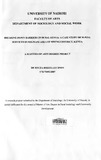| dc.description.abstract | The cellular mobile industry in Kenya has become one of the most popular and fastest growing industries in Kenya. Safaricom, Airtel (known as Zain during this study), Orange Kenya and Yu are the four mobile operators in Kenya. Safaricom is the most popular of the four with its mobile money transfer service, M-PESA, recording the highest number of users.
The objectives of this study were to determine rural peoples' perceptions ofM-PESA services; to establish the benefits of M-PESA services in rural Kenya; to find out the constraints to the growth of M-PESA services in rural Kenya; to establish the social implications of M-PESA services to rural dwellers. This was done through a case study of M-PESA services in Migwani, Mwingi District, Kenya.
The findings of this study show that the M-PESA service is becoming increasingly popular in rural areas where majority of Kenya's unbanked population resides. Time efficiency is rated as the most important attribute of the service that determines consumer's choice over other financial modes of money transfer. The cost, reliability, accessibility, userfriendliness of the system, safety and competence of staff rankings follow in that order. The aforementioned attributes also double up as benefits. However, its growth is threatened by lack of civic education, illiteracy and poverty. Network coverage; geographical distribution of M-PESA outlets, operation hours, technology phobia and lack of electricity are also additional challenges. The greatest threat that the service has posed to society, like most new technologies, is that it compromises the 'intimacy' of society which is a major characteristic of the African society.
The recommendations put forward are; Safari com to carry out civic education incorporating social aspects so as to minimise negative social implications of the service; The Government of Kenya to intensify rural electrification programs; M-PESA dealers to consider opening outlets in more interior parts of rural areas; use of solar should be encouraged; the social contribution of the mobile telephony sector be studied as opposed to its economic contribution that is the norm.
In conclusion M-PESA services have broken down barriers that have hindered development in the rural areas. For a population that is predominantly unbanked, the M-PESA service has potential to thrive in many areas of rural Kenya. The negative impacts are not ignored though overshadowed by the positives. M-PESA is almost becoming a necessity especially in rural areas where financial institutions are few and far between Its uniformity in services to all irrespective of status is particularly striking. | en_US |

